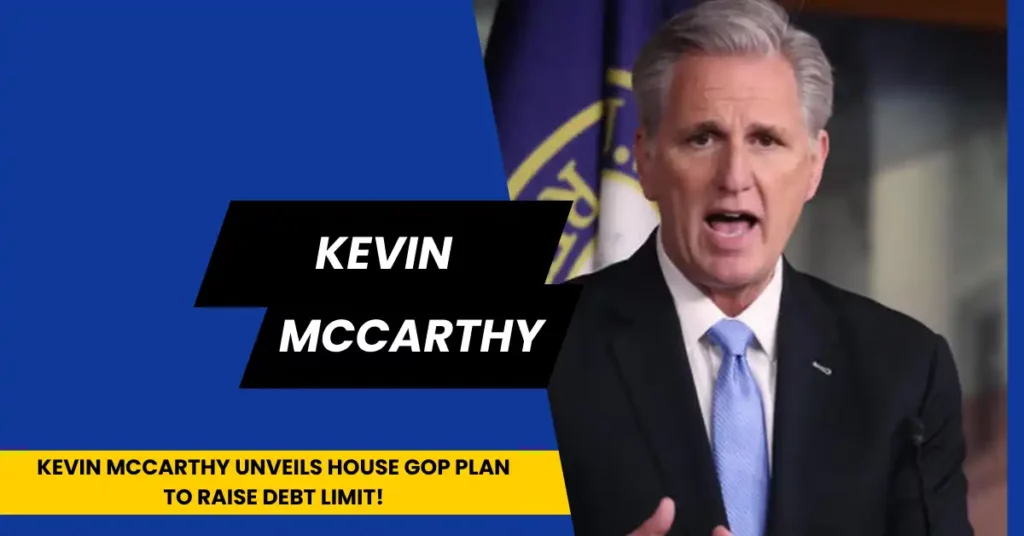House Speaker Kevin McCarthy made his opening offer to Democrats by outlining his plan to raise the debt ceiling and reduce government spending. He also urged President Biden to start negotiations as soon as possible because this summer’s deadline is to avert a default.
In a brief statement on the House floor on Wednesday, McCarthy stated that the GOP plan would raise the debt ceiling by $1.5 trillion or until the end of March 2024, whichever comes first. According to McCarthy, the 320-page bill, dubbed the Limit, Save, Grow Act, will save $4.5 trillion by bringing discretionary spending to the fiscal year 2022 levels and preventing future expenditures from increasing.
In addition, it would reinstate unused COVID-19 monies, halt Mr. Biden’s student loan forgiveness initiative, stop additional funding for the IRS, and impose work restrictions on federal aid programs, among other things.
The speaker stated, “If Washington wants to spend more, it will have to come together and find savings elsewhere, just like every household in America.” “President Biden has a choice. Come to the table and stop playing partisan political games, or cover his ears, refuse to negotiate and risk bumbling his way into the first default in our nation’s history.”
The proposal is anticipated to be debated on the House floor next week. During a New York Stock Exchange speech, McCarthy spoke about the bill’s general framework earlier this week.
McCarthy seeks to gain leverage before negotiations with the White House bypassing the GOP’s own package in the House, even though any legislation combining a debt-limit rise with budget cutbacks is doomed to failure in the Democratic-controlled Senate.
The White House has urged Republicans to pass a raise in the debt ceiling that is “clean” and does not include any budget cutbacks. Until McCarthy presents his plan, the White House will not negotiate. In his speech on Wednesday, the speaker urged the president to start negotiations again.
“They need to sit down, negotiate and address this crisis. Now that we’ve introduced a clear plan for responsible debt limit increase, they have no more excuse and refuse to negotiate,” McCarthy said.
It’s still unclear whether McCarthy has enough backing from Republican colleagues to get the plan through. Given the Republican Party’s tenuous majority in the House, McCarthy could only afford a few defections.
Rep. Tim Burchett of Tennessee, a Republican, claimed that McCarthy briefed him and a few other members in a meeting on Wednesday but that “it wasn’t really a pitch” or a “hard sale.” Burchett claimed he was the only person at the conference opposed to the proposal, though he added that he is “not there yet” in his support.
According to Georgia’s GOP Rep. Barry Loudermilk, it’s unclear if the bill would go through a committee procedure or move directly to the floor. During an economic speech in Maryland, Mr. Biden slammed McCarthy’s proposal and referred to the GOP bill as “not a plan.”
Mr. Biden added, “Look at what he didn’t say. “He didn’t specify how much he wants to cut for you. However, the top Republican plan for the House would reduce discretionary spending—or crucial programs—by 22%.
Check out some of the most recent trending articles:
Longer wait times would result from fewer Social Security and Medicare administration employees. More excellent prices for housing, particularly for older Americans, persons with disabilities, families with children, and veterans; more significant expenditures for preschool, college, and child care.
Karine Jean-Pierre, the White House press secretary, claimed on Thursday that “MAGA House Republicans are holding the American economy hostage to slash funding for programs that Americans depend on every day to survive.
” … House Republicans must avoid default and stop playing economic brinkmanship with the American people’s livelihoods and retirements. The American people have made clear which economic vision they support.”
Although the U.S. Treasury reached its current $31.4 trillion debt ceiling in February, Treasury Secretary Janet Yellen has subsequently taken “extraordinary measures” to prevent a default. Those efforts are anticipated to continue until June, after which the U.S. cannot fulfill its commitments.

